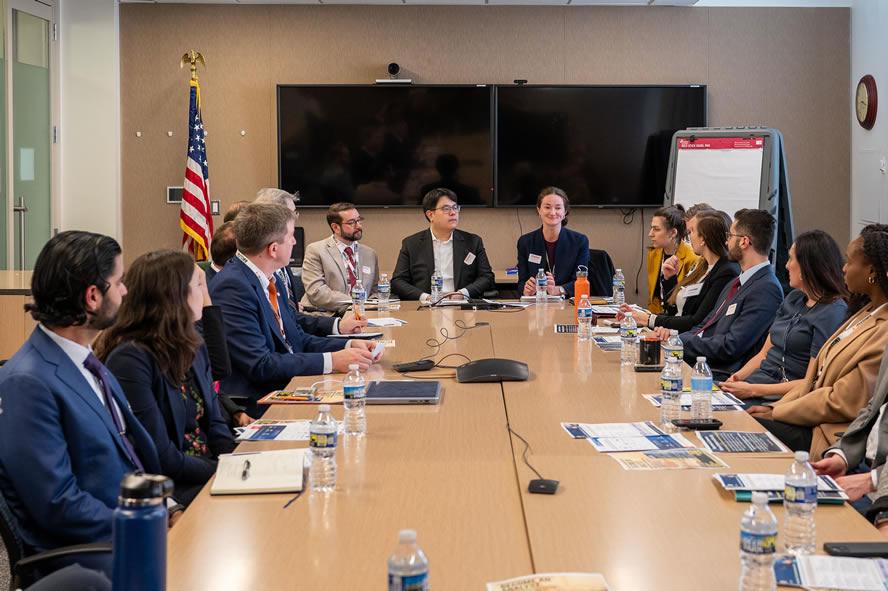-

Hear from Professor Monica Toft
Learn how Professor Monica Toft is shaping the study of global affairs and diplomacy at Fletcher.
Hear from Prof. Toft -

Explore Fletcher academics in action
Fletcher Features offers insights, innovation, stories and expertise by scholars.
Get global insights -
Get application tips right from the source
Learn tips, tricks, and behind-the-scenes insights on applying to Fletcher from our admissions counselors.
Hear from Admissions -

Research that the world is talking about
Stay up to date on the latest research, innovation, and thought leadership from our newsroom.
Stay informed -
Meet Fletcherites and their stories
Get to know our vibrant community through news stories highlighting faculty, students, and alumni.
Meet Fletcherites -

Forge your future after Fletcher
Watch to see how Fletcher prepares global thinkers for success across industries.
See the impact -

Global insights and expertise, on demand.
Need a global affairs expert for a timely and insightful take? Fletcher faculty are available for media inquiries.
Get in Touch
Master of International Business (MIB)
Business for a Better World

Drawing on the foundations of sustainability–environmental, social, and financial–Fletcher’s Master of International Business (MIB) prepares aspiring leaders to address the world's biggest challenges through business innovations.
The MIB combines the rigors of an MBA education with breadth in global affairs, training interdisciplinary problem-solvers who seek long-term, sustainable solutions beyond the promises of quarterly results.
Quantitative Methods Track (QM)
- Special STEM-focused track––enhances the MIB curriculum with quantitative training.
- Students from outside the United States may qualify for two additional years of optional professional training (OPT)
Key features:
- 2-year residential program on Fletcher's Boston-area campus
- Combination of theory and experiential learning to train employment-ready leaders
- Dynamic career focus and support for both students and alumni
- Scholarships and research assistantships available to eligible students and career acceleration grants offered to all accepted MIB students
- Program focus on sustainability trains leaders who can identify solutions with longevity for their organizations, society, and the planet.
- Mentorship program that pairs students with mentors to support their professional journeys
- Access to globally influential faculty, alumni, guest speakers, and advisors
- No GRE/GMAT requirement for admission
Student profile:
- Two to five years professional experience preferred (in any sector)
- Median age range: 26-30
Program overview

Fletcher’s MIB prepares you for a career in global business. Through its rigorous core curriculum, you’ll develop the business acumen and international edge that are invaluable to driving change in an interconnected world.
- Core business curriculum: strategic management, corporate finance, accounting, leadership, sustainable business, marketing or supply chain management
- Classes across a breadth of Fletcher disciplines: law, economics, and policy
- Two fields of study to allow for specialization and focus
- A practically-oriented capstone to accelerate career-ready skills
- Four semesters and at least 16 courses (48 credits) to complete
Join an international network of dynamic and fearless business leaders.
A conversation with MIB alumna Kelly Liu on sustainable and socially responsible business
Read More
High Energy Solutions for the World of Tech
A conversation with MIB alumnus Adrian Anderson on renewable energy and high-impact climate work
Read More
Business know-how with an international edge
The MIB is structured around incisive fields of study that can help you succeed across multiple career paths.
By pairing one global affairs field of study with one MIB field of study, students develop contextual intelligence and unique ways to solve problems. Learn to think proactively about emerging technologies with a focus in Technology and International Affairs, or consider the relationship between digital innovation and international security.
- International Finance and Banking for a Sustainable World: Prepare for a career in corporate finance, investment management, impact investing, and capital markets.
- Strategic Management and Consulting for Global Impact: Train for work in high-level corporate management. Become an advisor or consultant and learn to take a strategic perspective across the firm.
Self-designed field: Maybe you want to work in technology policy or lead the data privacy team at a major technology company. Or you want to develop skills as an entrepreneur and study entrepreneurship and venture capital.
Build a career in sustainable, global business

Fletcher’s MIB opens doors.Through the program’s focus on sustainability, students graduate prepared to become leaders ready to solve problems for the twenty-first century. The MIB Quantitative Methods Track (QM) can also prepare you for an exciting career using data to solve global business challenges.
During your time as a student, there’s a lot to learn outside of the classroom. Fletcher helps you explore your interests–or launch your next venture.
- Professional coaching
- Boston-area networking opportunities
- Alumni network of change markers around the world
- Support for international case competitions
- Campus-wide competitions
- Annual Fletcher D-Prize poverty solutions competition
- Global Consulting Program
- Career Acceleration Grant to advance your professional skills
“Learning in an environment where you are confronted with such diversity in cultural backgrounds, different approaches to problem solving, and different educational and professional experiences is incredible. It’s one of the experiences I cherish most in my life. Especially for a career in ESG, sustainability, and impact investing, thinking outside of the framework of a traditional business school education is critically important.”
-Hattie Brown F20, Managing Director of Impact and ESG, Kirchner Group
MIB required classes
-
EIB-B200 Foundations in Financial Accounting and Corporate Finance
An introductory course to corporate finance from the perspective of the chief financial officer (CFO). The first part of the course deals with financial planning and budgeting, financial analysis, and short-term financial management. The second part of the course develops a valuation framework for making investment decisions (capital budgeting) for new equipment, the launch of new products, mergers and acquisitions and LBOs... and the funding/financing decisions to be coordinated with those investment decisions. Special attention is given to the cost of capital and valuing stocks, bonds, convertible and preferred.
EIB-B207M Financial Statement Management
Accounting is an economic information system, and can be thought of as the language of business. Accounting information provides individuals with a starting point to understand and evaluate the key drivers of the firm, its financial position and performance. This can then be used to enhance decisions, as well as help predict a firm’s future cash flows. The present (or current) value of those cash flows provides an estimate for the value of the firm. This course will cover the basic vocabulary, concepts, procedures and mechanics of financial and managerial accounting and the role of accounting information in society.
EIB-B238 Strategic Management
Effective strategists can: size up the dynamics of the external environment of a firm, covering its economic, political, and social contexts; take a holistic view across all functions and configure all of a firm’s internal choices to give it a competitive advantage; sustain this advantage over time and leverage it into adjacent business and geographic opportunities; use acquisitions and alliances when these are the more effective approaches to support a strategy; create the right organizational context to execute the chosen strategy efficiently; ensure the continuous renewal of the firm in anticipation of and adapting to its changing environment. The objectives of this short course are to master the field’s core concepts and to build the skills needed to be an effective strategist.
EIB-B291 Leadership: Building Teams, Organizations, and Shaping Your Path
This course explores the fundamental aspects of managing and leading people including: managing one-on-one relationships; influencing team behavior; and motivating and aligning people behind a common vision. It also examines the challenges and tradeoffs in creating a meaningful personal leadership path, especially in the early stages of your career. The course pedagogy is case-method discussion, drawing primarily on cases from the private sector, supplemented with comparative material from the public sector and civil society. This course will provide you with a number of critical concepts and competencies that will be useful in both the short term and long term. It will help you to make the transition from an individual contributor to a manager and, over time, build a career of increasing responsibility as a leader.
-
EIB-B240 Sustainable Business Dynamics
Advances in technology, emergent social issues and pressing environment challenges are elevating the importance of corporate sustainability. Independent of the chosen designation (CSR, corporate responsibility, ESG…) an array of stakeholders (including NGOs, employees, consumers, communities, investors, and the planet) are expanding the boundaries of responsibility and elevating expectations for corporate executives. This course provides students with an understanding of the nomenclature, frameworks, and analytical tools needed to effectively integrate sustainability and responsibility into the management of a corporation.
EIB-B252 Corporate Sustainability in the Age of Globalization
The context for business and society is changing in (at least) four ways: globalization and a lack of global governance; increasing relevance of ESG (environment, social and governance) challenges; rising scale and scope of corporate activities; digitalization and datafication. These changes create new challenges as well as opportunities for business but also for their stakeholders. Stakeholders as diverse as investors, employees, the media, NGOs, and customers often have strong views on how corporations should address these new issues.
-
EIB-B263M Marketing Management
It is not an overstatement to say that all non-monopolistic companies, NGOs and even government-sponsored organizations live or die by their ability to effectively market their products and services. In today’s hyper-competitive global markets, organizations that excel at identifying their customers, determining how to meet their interests and needs, and delivering an outstanding experience will be the winners. This course will cover six key market functions and responsibilities: understanding the roles and responsibilities of a marketer; segmentation: identifying and targeting your best customers; strategic social media: when, how, what and with who; sales enablement and support; brand strategy; delivering a superior customer experience. We will look at marketing issues facing both private and non-profit sector organizations. All the topics in the course will be discussed in an international context, including the unique issues that marketers face in global markets.
EIB-B281M Managing Operations and Supply Chains in Global Companies
A management-oriented, case study-based course on how companies design, manage, and measure operations around the globe today. The core topics will be: the exercise of competitive advantage through operational capability; business process design; supply chain management; lean operations; disruptive operations innovations; operations networks and connectivity; talent management; the managerial metrics revolution; etc. Readings and cases will focus on both the operations themselves and the management issues surrounding them.
-
ILO-L230 International Business Transactions
This course provides an examination of private and public law aspects of international business transactions, including conflicts of law and comparative law issues. It examines the selection of the optimal business format for international operations, including branch, subsidiary, joint venture, technology license and distributorship; international commercial law, including sales contract, and commercial documents; international contracts and dispute resolution issues, including governing law, and choice of forum, force majeure, and treaty issues; and the United States Foreign Corrupt Practices Act.
ILO-L233 International Financial and Fiscal Law
This course is intended to introduce students to the legal and regulatory context of international finance. It covers selected domestic and international aspects of (i) corporate law relating to finance, (ii) bank financing and regulation, (iii) securities financing and market regulation and (iv) insolvency law. It also addresses the process of innovation in international financial law, with coverage of emerging market debt, swaps and other derivatives, privatizations, and securitization. These topics will be reviewed from the standpoint of domestic law of the United States and other selected jurisdictions, as well as from the standpoint of applicable international law and practice.
-
EIB-B206 Data Analysis and Statistical Methods for Business
This course provides an overview of classical statistical analysis and inference. The goal is to provide you with an introduction to statistical thinking, concepts, methods, and vocabulary. This will give you some tools for dealing with statistical methods you may encounter in your coursework or research while at The Fletcher School, especially “regression analysis,” which is covered at the end of the course. In addition, this section of the course has a particular emphasis on business applications.
-
EIB-E211 Microeconomics
Microeconomics does not address every question about the economy, but it does provide tools to answer numerous questions about the choices individuals and firms make. The set of tools microeconomics gives you can be used to solve almost any economic problem an individual person or firm faces. In this course, we will start with theories and models, explanations of how things work that help us understand and predict how and why economic entities (consumers, producers, industries, governments, etc.) behave as they do; we will also cover theories and models that help us understand and predict how competitive, oligopolistic, and monopolistic markets work, as well as situations in which markets might not work well (e.g., asymmetric information, externalities, and public goods). To learn the intricacies of the theories and models, we will use the tools of graphs and mathematics. We then use theories and models to look at how people and firms actually behave in real life (including some seemingly noneconomic situations).
EIB-E217M Managerial Economics
This course is a brief introduction to management issues presented from the perspective of economics. The focus is on the strategic responses a firm can make regarding both its internal organization and its external interaction with both consumers and other firms. Students will learn the role of economic analysis in determining organizational design and developing competitive strategies whether the organization is a for-profit firm or a non-profit enterprise.
Looking for more information? Get in touch -
Loading...



